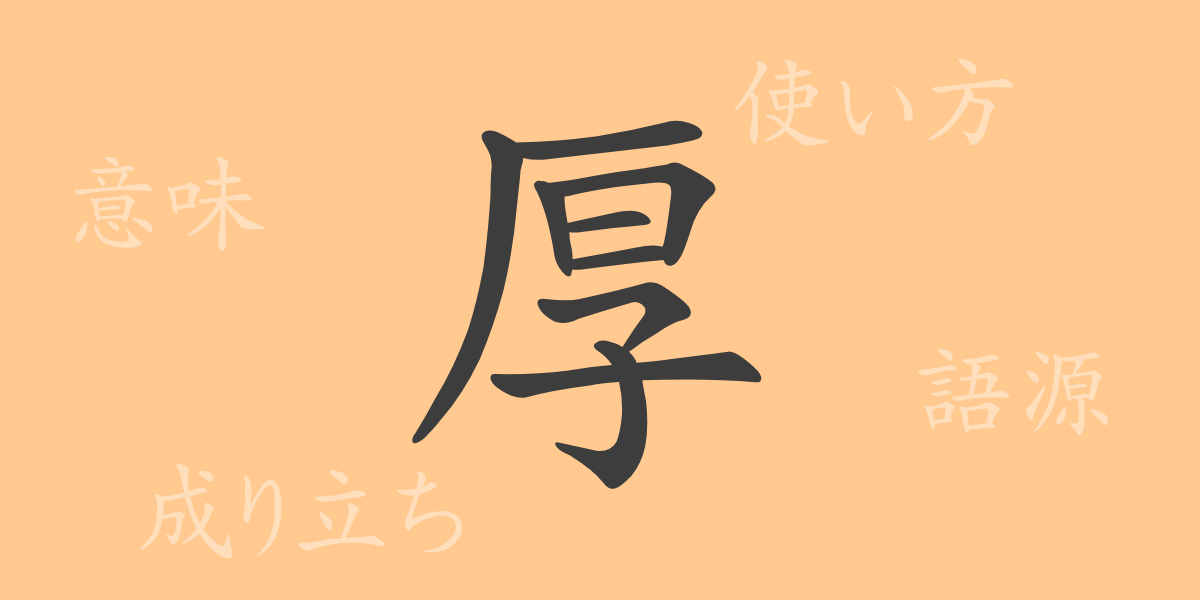Japanese contains numerous kanji characters, each with its unique history and meaning. In this article, we will focus on “厚(あつ)”—a commonly used kanji in Japanese. We will delve into its origins, meanings, usage, and the idioms and proverbs that feature this character. By exploring how this kanji is embedded in our daily language, we aim to highlight its charm and significance.
Origins of 厚(あつ)
The kanji “厚(あつ)” evolved from ancient Chinese pictographs. Originally, it depicted a mound of earth, symbolizing a tomb, with the “厂” character representing a cliff or slope. This combination illustrated the idea of thickening the earth, leading to the meanings “thick” or “thickness.” Over time, its meaning expanded beyond physical thickness to include metaphorical thickness, such as deep emotions or sincerity.
Meanings and Uses of 厚(あつ)
“厚(あつ)” is often used to denote physical thickness but also expresses depth in human relationships and emotions. For example, “厚意(こうい)” means kindness or goodwill, while “厚情(こうじょう)” refers to deep affection or empathy. In societal contexts, “厚生(こうせい)” means welfare or well-being, and “厚労省(こうろうしょう)” is the abbreviation for the Ministry of Health, Labour and Welfare in Japan.
Readings, Stroke Count, and Radical of 厚(あつ)
The kanji “厚(あつ)” is frequently used in daily life, making it useful to understand its readings, stroke count, and radical.
- Readings: The on-yomi (Chinese reading) is “コウ(こう),” and the kun-yomi (Japanese reading) is “あつい” or “あつ-“
- Stroke Count: “厚(あつ)” has a total of 9 strokes.
- Radical: The radical for “厚(あつ)” is “厂(がんだれ),” meaning “cliff.”
Idioms, Phrases, and Proverbs Using 厚(あつ)
There are numerous idioms, phrases, and proverbs featuring “厚(あつ),” each used in different contexts. Here are a few examples:
- 厚顔無恥(こうがんむち) – Describes someone shameless and audacious.
- 厚生労働(こうせいろうどう) – Pertains to public welfare and labor environment improvement.
- 厚情深誼(こうじょうしんぎ) – Signifies deep affection and close friendship.
- 厚き門松(あつきかどまつ) – Refers to the custom of making thick kadomatsu (New Year’s pine decorations) to wish for a prosperous year.
- 厚礼を以て迎える(こうれいをもってむかえる) – Means to welcome someone with great respect and courtesy.
Conclusion on 厚(あつ)
This article has explored the origins, meanings, and uses of the kanji “厚(あつ),” along with idioms and proverbs that feature this character. From physical thickness to the depth of human relationships, “厚(あつ)” has a wide range of applications. Understanding this kanji enhances our ability to express ourselves more richly in Japanese. Use the deep meanings of “厚(あつ)” to enrich your daily communication.

























